#C.L.R. James
Explore tagged Tumblr posts
Text



On this day in … 1989, C.L.R. James died in Brixton, England. He was a Trinidadian historian, journalist, Trotskyist activist, Marxist writer, and huge cricket fan. His works are influential in various theoretical, social, and historiographical contexts. His work is a staple of Marxism, and he figures as a pioneering and influential voice in postcolonial literature. A tireless political activist, James is the author of the 1937 work ‘World Revolution’ outlining the history of the Communist International, which stirred debate in Trotskyist circles, and in 1938 he wrote on the Haitian Revolution, ‘The Black Jacobins.’
“The rich are only defeated when they’re running for their lives.” — C.L.R. James
digital art hand drawn by @pyrotoons
#drawings#drawing#draws#portrait#sketches#sketch#history#sketchbook#illustration#drawing sketch#sketching#portrait drawing#digital illustration#digital drawing#digital art#clr james#C.L.R. James#black jacobins#trinidad and tobago#historian#revolutionary#haitian revolution#post colonialism#anti colonialism#philosophy#Marxism#trotsky#20th century
5 notes
·
View notes
Text



Good reading for a real understanding of Haiti, past and present rather that the lies told by Trump
Silencing the Past by Trouillot spends two chapters on the history of Haiti and reveals more than all of the lies, fear-mongering, and 1/2 truths combined.
READ IT!
#Haiti#C.L.R. James#The Black Jacobins#Michel-Rolph Trouillot#Silencing the Past#Power and the Production of History
4 notes
·
View notes
Text
"I am a black man number one, because I am against what they have done and are still doing to us; and number two, I have something to say about the new society to be built because I have a tremendous part in that which they have sought to discredit."
--C. L. R. James, C. L. R. James: His Life and Work
4 notes
·
View notes
Video
youtube
In Conversation with Stuart Hall
4 notes
·
View notes
Text
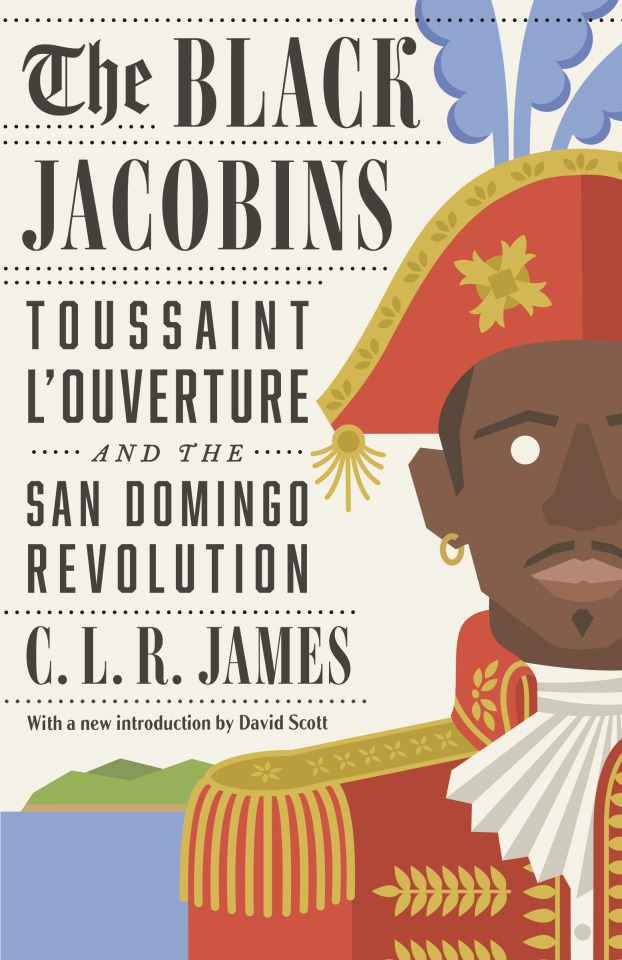
The Black Jacobins: Toussaint L'ouverture and the San Domingo Revolution
By C.L.R. James.
4 notes
·
View notes
Text
Literatur, die im Dunkeln leuchtet
Zwei Anthologien mit Texten afrikanischer Autor:innen bieten vielfältige Perspektiven und Haltungen, um die festgefahrenen Denkmuster über Afrika aufzulösen. Continue reading Untitled
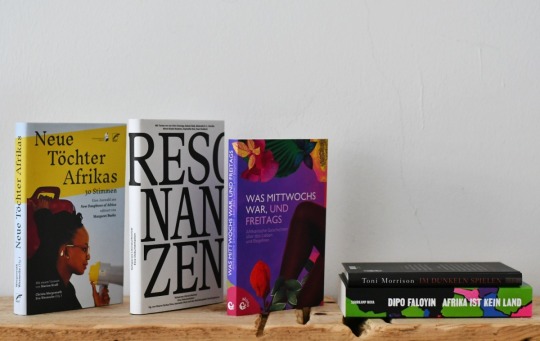
View On WordPress
#Abdulrazak Gurnah#Ada Diagne#Afua Hirsch#Alice Walker#Aminata Cissé Schleicher#Angela Davis#Ann Petry#Audre Lorde#Bahati Glaß#Barbara von Bechtoldsheim#bell hooks#Bernardine Evaristo#Buchi Emecheta#C.L.R. James#Chimamanda Ngozi Adichie#Clive Allison#Dean Ruddock#Dipo Faloyin#Dominique Haensell#Doreen Baingana#Eleonore Wiedenroth-Coulibaly#Elisa Diallo#Ellah P. Wakatama#featured#Gayl Jones#Helga Pfetsch#Helon Habila#Ibou Coulibaly Diop#Imbolo Mbue#Ishmael Reed
0 notes
Text
I think that one of the things that happens both in Du Bois and in C. L. R. James is that at one moment they are addressing the slave, the ex-slave, the fugitive — then suddenly this figure has been translated into the narrative of the worker. And in the worker’s narrative, the very figure that I’m concerned with, the Black female, the fungible life, the minor figure, totally falls out of the frame of what constitutes the political notion of struggle. The “everyday resistance of enslaved women” in the context of a slave economy, for example the refusal to reproduce life, has never been considered as a component of the general strike. Yet, they too were involved in a fundamental refusal of the conditions of work and intent on destroying an economy of production in which their wombs and their reproductive capacity were conscripted along with their labor.
Saidiya Hartman in conversation with Rizvana Bradley
#Saidiya Harman#Rizvana Bradley#W.E.B Du Bois#C.L.R James#Black feminism#erasure: a tortured silence#antiblackness as the foundation of the world#the afterlife of slavery
164 notes
·
View notes
Text



C.L.R. James (1901–1989) was a renowned Trinidadian intellectual, historian, writer, and activist who became one of the most influential figures in the history of Caribbean and Pan-African thought. Born on January 4, 1901, in Port of Spain, Trinidad, James made significant contributions to literature, history, and political theory. His works spanned a wide range of subjects, including history, Marxism, anti-colonialism, and the African diaspora, and he was a key figure in the development of radical thought in the 20th century.
James is perhaps best known for his seminal work, The Black Jacobins (1938), a historical account of the Haitian Revolution (1791–1804), which he considered one of the most important events in world history. In the book, he examined the revolution's leaders, particularly Toussaint Louverture, and explored the complex interplay of race, class, and revolution. The Black Jacobins not only reshaped the historical narrative around Haiti but also provided a foundation for understanding the global significance of anti-colonial struggle.
In addition to his historical writings, James was an ardent Marxist and Pan-Africanist, advocating for the liberation of colonized peoples and promoting the unity of the African diaspora. He was deeply influenced by figures such as Leon Trotsky, and his political activism spanned various movements, including the independence struggles in the Caribbean and Africa. James was also a passionate writer and speaker, contributing to the intellectual ferment of his time with essays, speeches, and articles on culture, politics, and revolution.
James’s political and intellectual journey took him to various parts of the world. In the 1930s and 1940s, he lived in the United Kingdom and became involved in the Labour movement, and later in the United States, where he was a vocal supporter of civil rights and anti-colonial movements. He was closely connected with prominent political figures, including the Nigerian nationalist Nnamdi Azikiwe and the African-American intellectual W.E.B. Du Bois. His writings and activism also had an impact on the independence movements in Africa and the Caribbean, and he became a key figure in the Pan-African movement.
In the 1950s, James’s political views evolved, and he distanced himself from certain Marxist ideologies, while still advocating for the liberation of oppressed peoples. Despite his profound influence, he faced political and intellectual marginalization in the latter part of his life, particularly due to his criticisms of both Soviet communism and Western imperialism.
C.L.R. James spent his final years in the United States and the United Kingdom, where he continued to write and lecture on a variety of subjects, including history, politics, and culture. He died on May 31, 1989, at the age of 88, in London. His death marked the loss of a towering intellectual figure, but his legacy as one of the foremost thinkers on issues of race, revolution, and decolonization continues to resonate in the fields of history, literature, and political theory.
Today, C.L.R. James is remembered as one of the most important Caribbean intellectuals of the 20th century, and his works remain widely studied for their insight into the intersections of race, class, revolution, and colonialism. His vision of a world free from oppression and his contributions to the understanding of revolutionary movements, particularly in the context of the African diaspora, continue to inspire activists, scholars, and writers around the world. 🇹🇹
#clr james#black people#black history#black#blacktumblr#black tumblr#pan africanism#black conscious#africa#black power#black empowering#black intellectual#trinidad and tobago#afro caribbean#biography
62 notes
·
View notes
Text







Christopher Cozier, b. 1959, Trinidad & Tobago, where he lives and works.
Broadly influenced by the work of Marxist Trinidadian historian writer C.L.R. James, Cozier’s practice takes a critical look at the relationship between Western colonialism and current industrial and economic conditions in Trinidad. Beyond his own artistic practice, Cozier mentors local artists in Trinidad and Tobago in his capacity as co-director of Alice Yard, a project space and residency program in Port of Spain.
In his notebook drawings, video installations, public actions, and prints, Christopher Cozier explores and reframes the historical and contemporary narratives that shape our understanding of the Caribbean and the politics of globalism. Cozier has exhibited at international venues including the Liverpool Biennial, Sharjah Biennial, and Berlin Biennale, and his work has been included in exhibitions at the Brooklyn Museum and Tate Liverpool. In 2013, he received a Prince Claus Award.
Christopher Cozier was born and continues to work in Port of Spain, Trinidad & Tobago, as a painter, writer, and curator.
https://nationalgalleryofjamaica.wordpress.com/.../chris.../
14 notes
·
View notes
Text
Despite the endless discourse on Twitter about why “Black people don’t need to read Marx,” which reads like something an FBI intern would start discourse about, I’ve never actually seen anyone suggest a real alternative.
I love Black revolutionary writings, but very little of it is about the pernicious development of the capitalist mode of production, the ways in which it’s changed over the last couple of centuries, or proletarian alienation.
The critiques aren’t a replacement, either.
I always recommend Walter Rodney’s How Europe Underdeveloped Africa, W.E.B. Du Bois’s Black Reconstruction, Eric Williams’ Capitalism and Slavery, Angela Davis’ Women, Race and Class, and C.L.R. James’ The Black Jacobins - but none of these are a substitute for Capital Vols. 1, 2 & 3.
For secondary literature, Ruth Wilson Gilmore’s Golden Gulag, Immanuel Wallerstein’s The Modern World System I-IV, Cedric Robinson’s Black Marxism: Alexander Anievas & Kerem Nisancioglu’s How The West Came to Rule, and Frantz Fanon’s The Wretched of the Earth (and A Dying Colonialism) are also incredible - but none are a substitute.
Does anyone actually have a substitute for Marx that they’ve engaged with?
#Marxism#socialism#communism#theory#reading#suggestions from anyone?#Karl Marx#Ruth Wilson Gilmore#Stuart Hall#Kohei Saito#Walter Rodney
14 notes
·
View notes
Text
[D]eviance and mischief. [...] [F]urtive [...]. [O]ther poetically inspiring words: secretive, surreptitious, clandestine, covert, conspiratorial, oblique [...]. We must fold these small acts of love and creativity and play (and laughter and irreverence and whimsy) into other resistant projects against white supremacy [...]. In various trans-American imaginaries, the boonies are raced as nonproductive land inhabited by people who are not fully part of the Western episteme. [...] Caribbean(ist) people are familiar with el monte, the hills, or les mornes. El monte is always just around the corner, encroaching, sprouting persistently [...] amid the rubble of hurricane disasters or abandoned plantation and industrial sites. [...] The hills, like much of our hemisphere, are sites of damage containing the residual energy of violence, [...] the “places of irresolution.” [...] [T]urn over rocks and push thorny vines to the side to find wet dirt, small creatures, and, perhaps, delightful hidden treasures [...]. I open my hands so that these and other surprises "jump into [them] with all the pleasures of the unasked for and the unexpected" [...]. Remaining open to these gifts of the nonhuman natural world [...]. How much ruddier might we be against the multiheaded hydra of white supremacy as “a world of mutually-flourishing companions” [...]?
Text by: Dixa Ramirez D'Oleo. "Mushrooms and Mischief: On Questions of Blackness." Small Axe 23 (2 (2)): 152-163. July 2019.
---
Every day I wake up and rehearse the person I would like to be. […] To use the words of [...] C.L.R. James, “every cook can govern.” [...] [T]his is what happens when people consciously decide to come together and “shape change,” [...]. And to move through the world with the intention of making it a better place for living creatures to inhabit. […] And most importantly, it’s an invitation to join in. And it is a reminder that liberation is not a destination but an ongoing process, a praxis. Every day, groups of parents, librarians, nurses, temp workers, ordinary people, tired of the horrors of the present, come together to decide what kind of world they want to inhabit. […] [W]e bear witness to rehearsal, study, experimentation in form, a multiplicity of formations of struggle being waged, often most strongly by people for whom freedom has been most denied. [...] “If We Must Die”: “Pressed to the wall, dying, but fighting back!” [...] [F]or so many people, whether abandoned by the state [...] or abandoned by society in a carceral site, fighting back, by virtue of necessity as well as of ethics, is building, always building. This [...] the care work, of rehearsal.
Text by: Robyn Maynard. “Every Day We Must Get Up and Relearn the World: An Interview with Robyn Maynard and Leanne Betasamosake Simpson.” Intefere: Journal for Critical Thought and Radical Politics Volume 2, pages 140-165. 19 November 2021.
---
The no of refusal is a mode of survival: an impenetrable boundary, silent or shouted. It is a refusal to be killed or to succumb [...]. Vast ecosystems flattened for plantations and fields, raw minerals pulled from the ground and sea for the building of nation-states [...]. Being-with requires a pause from which to imagine this otherwise, in all of its vastness and uncertainty. [...] To be-with [...] needs a disposition of attentiveness, listening, curiosity and noticing, [...] a "pedagogy of deep engagement". [...] The scale of violence [...] is immeasurable. [...] The immensity of the loss of people and ecologies to capitalist brutalities exceeds what we can comprehend. But [...] so do the myriad, and insuppressible flourishings and alliances, the joyfulness and love, the lives lived otherways. Attunement leads us to the gaps and silences and soundings that run through everything [...]. [T]hose imaginations of life [...] might rise to the surface.
Text by: AM Kanngieser. "To undo nature; on refusal as return." transmediale Almanac. 2021.
#ecology#multispecies#landscape#haunted#abolition#imperial#colonial#indigenous#temporality#halloween i guess idk#tidalectics#archipelagic thinking#carceral geography#debris ruins ruination etc#caribbean
55 notes
·
View notes
Text
quite contrary: mary macdonald + historical context, music
this is my Mary MacDonald playlist and I'd like to talk a little about my interpretation of her and her cultural/historical context! it might not align with fanon, ive no idea but idc frankly haha. I hope to have done my due diligence in terms of research (i'm an absolute research fiend) and in general this is a topic I'm personally highly interested in. because it's highly interesting and (ime) little-discussed. I'll be providing links for further reading. tagging @goldenromione bc she asked me to do this!
so in my fic Mary is a muggle-born girl from a British-Caribbean family in Croydon. Her family owns a Caribbean restaurant in Thornton Heath. She's rebellious and punky and gets a lot of this from her two older brothers, both Muggles; Toby, the eldest, is part of the Race Today Collective in Brixton, dedicated to the publication of a political magazine (Race Today) on race relations in the UK. The middle brother, Lewis (who has a fling with Sirius as a matter of interest lol) is a musician/DJ very active in the Ska Revival/Two-Tone scene of the late 70s-early 80s.
All this is very influential on Mary; she is very outspoken about muggle-born rights at school, and her music taste reflects her background. I do think she would like women-led punk especially x-ray spex, but also in terms of ska a group I think she'd have liked is the selecter, which features pauline black the coolest female vocalist i've ever seen in my entire life. just look at her:
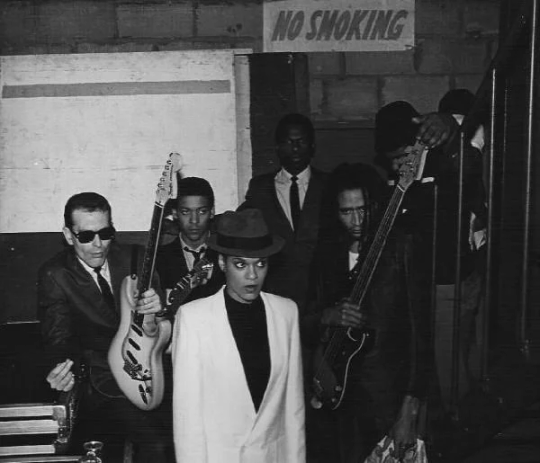
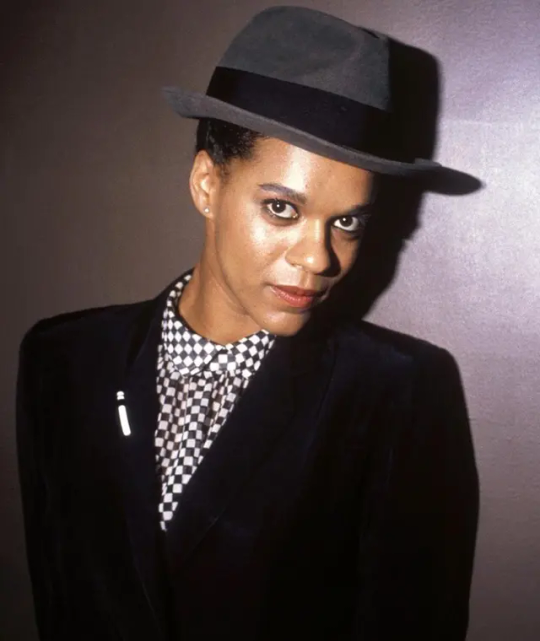
this will be explored in the upcoming 4th part of my fic, in which we see Sirius in his Brixton flat, and Mary and Lewis both spend a lot of time there. Specifically, he lives on Railton Road, which was a very important street in terms of both Black and LGBT history in Britain. It was the scene of the 1981 Brixton Riot and the location of many collectives at different points like the British Black Panthers, the 121 Centre (one of London’s longest running squats, also housed anarchist groups and other orgs), the aforementioned Race Today Collective, the Pink Fairies/South London Gay Community Centre, among others. It was also the home of many important Black British activists and historical figures like C.L.R. James, Darcus Howe and Leila Hassan. A few links:
A Radical History of 121 Railton Road By the Waters of Babylon; The Battle of Railton Road; International Centres Today in London gay history: the South London Gay Centre evicted, Brixton, 1976 Activist Streets (on history in Thornton Heath, linked above)
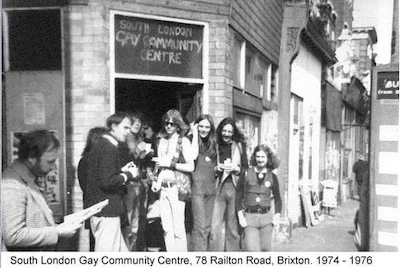

If anyone is interested in this topic I cannot, cannot recommend enough the miniseries Small Axe on Amazon, which covers a few different important moments in Black British history from the 60s to the 80s. It's so incredibly good and the soundtrack is SUPREME. Another good one to get a feel for the period is In the Long Run, created by Idris Elba and set in London in the 80s, loosely based on his own childhood.
Lastly, a few images of how I see Mary under the cut:




this is simona brown, my mary fancast, though the image I used for my playlist is of brenda sykes who I also think is an absolute Mary vibe.
#mary macdonald#mary#marauders era#mine#the darkest days#idk how to tag this tbh im just leaving it like that#the stranglehold that typeface has had on london signage lmao#i always thought it was futura but its johnston apparently#Spotify
38 notes
·
View notes
Text
Moving Against the System: The 1968 Congress of Black Writers and the Shaping of Global Black Consciousness

Moving Against the System: The 1968 Congress of Black Writers and the Shaping of Global Black Consciousness
In 1968, as protests shook France and war raged in Vietnam, the giants of black radical politics descended on Montreal to discuss the unique challenges and struggles facing their black comrades all over the world. Against a backdrop of widespread racism in the West and ongoing colonialism and imperialism in the Global South, this group of activists, writers, and political figures gathered to discuss the history and struggles of people of African descent and the meaning of black power. For the first time since 1968, David Austin brings alive the speeches and debates of the most important international gathering of black radicals of the era. With never-before-seen texts from Stokely Carmichael, Walter Rodney and C.L.R. James, these documents will prove invaluable to anyone interested in black radical thought and political activism of the 1960s.
5 notes
·
View notes
Text

“As the class struggle sharpens in the U.S. Marxism will come into its own as a great popular study.”
C.L.R. James
#blacktumblr#black history#black liberation#african history#nodeinoblackbusiness#buy black#clr james
15 notes
·
View notes
Text




Joshua Brown's illustrations of E.P. Thompson, C.L.R. James, Natalie Zemon Davis and Eric Hobsbawm in Visions of History (1984) by MAHRO - The Radical Historians Organization.
7 notes
·
View notes
Text
Read -> Reading -> To-Read: Black History Month Graphic Novel Round Up
Check out these awesome graphic novels reader's advisor Ashley has been picking up for Black History Month!

Read: Kindred by Octavia Butler, adapted by Damian Duffy
This graphic novel was adapted from the book Kindred by Octavia Butler. This story more recently has also been made into a TV series for Hulu. In this twisted tale, Dana is living in the 1970s when she begins having dizzy spells shake her to the core. These dizzy spells lead to her waking up in the 1800s helping a boy who she refers to as “Rufe.” While Dana is not sure what brings these spells on at first, she has an even harder time time trying to figure out how to make it stop.
Ms. Davis: A Graphic Biography by Sybille Titeux de la Croix, art by Amazing Ameziane
The story of Angela Davis is filled with resistance and unwillingness to accept unfair treatment and judgment. She is infamous for being a part of the FBI's Most Wanted List in 1971 due to an incident that occurred where she was accused as the main conspirator.
Reading her story as a graphic novel does not take away the seriousness of her story. I appreciate that the book provides explanations of key events; that is helpful if you are only hearing about some of the events for the first time, as I was. This book was a random find but it sent me down a research hole that made me want to learn more, and that is what any good book does.
Reading: Miles Davis and the Search for the Sound by Dave Chisholm
Miles Davis was an extremely talented musician. He thought outside of the box when it came to his music, so it is fitting that this graphic novel tells his story in an eclectic way.
The story begins as Miles has just gotten a piece of life-altering news in 1982. From there, he reminisces and begins telling his origin story. The artwork and illustrations of this graphic novel are beautiful. The colors truly jump off the page and speak to you, as clear as the words do. The funky art and the insight of Miles' fascinating yet tumultuous life make this book a true learning experience that explores the cool world of jazz and many of its legends.
To-Read: Toussaint Louverture: The Story of the Only Successful Slave Revolt in History by C.L.R. James, adapted by Nic Watts and Sakina Karimjee
This graphic novel details the Haitian Revolution led by Toussaint Louverture. This graphic novel is based on the play by C.L.R. James, produced in 1936. If you love history, and revolutions, this graphic novel my pique your interest.
See more of Ashley's recs
#octavia butler#angela davis#miles davis#toussaint louverture#black history month#book recommendations#graphic novels#nonfiction#history#biography#science fiction#kindred#damian duffy#ms. davis#sybille titeux de la croix#amazing ameziane#miles davis and the search for the sound#LCPL recs#ashleyrecs#read reading to read#c.l.r. james#nic watts#dave chisholm#sakina karimjee
10 notes
·
View notes